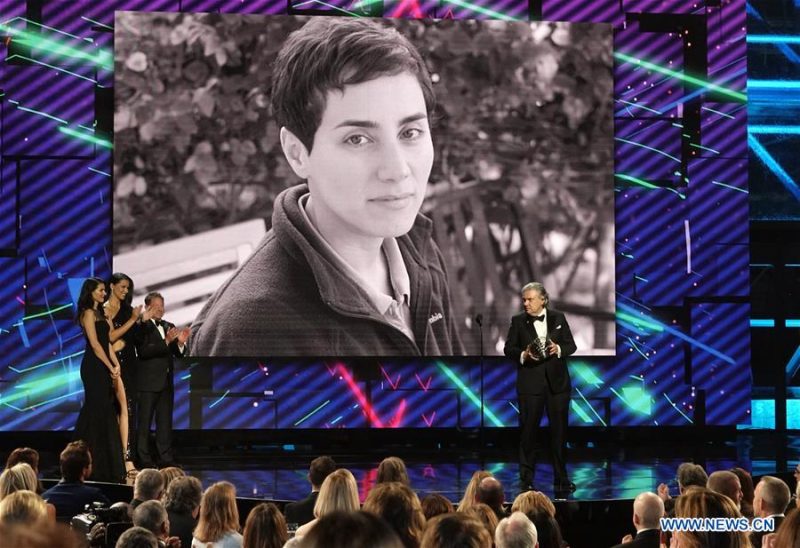The Breakthrough Prize Foundation held an awards ceremony here on Sunday to award a total of 21 million dollars worth of prizes to ten of the world’s top scientists for their remarkable achievements in fundamental physics, life sciences, and mathematics. Six New Horizons Prizes, worth 600,000 dollars in total, were also awarded to three mathematicians and nine physicists for early-career achievements in their respective fields. (Xinhua/Wu Xiaoling)

SAN FRANCISCO, Nov. 4 (Xinhua) — Winners of the 2020 Breakthrough Prize and recipients of other awards including 2020 New Horizons have been honored for their ground-breaking scientific contributions at a star-studded gala in the U.S. Silic
on Valley.Alex Eskin (R), winner of the 2020 Breakthrough Prize in Mathematics, pays tribute to late Iranian mathematician Maryam Mirzakhani, his research partner who passed away in 2017, at an awards ceremony at NASA Ames Research Center in Mountain View, California, the United States, Nov. 3, 2019.
Six scientists and one team of researchers received the 2020 Breakthrough Prizes, each carrying 3 million U.S. dollars, for their research achievements in life sciences, fundamental physics, and mathematics at the eighth annual awarding ceremony held on Sunday night at NASA Ames Research Center in Mountain View, California.
The Breakthrough Prize in Fundamental Physics was awarded to the Event Horizon Telescope Collaboration, a global collaboration of scientists at 60 institutions in 20 countries and regions, for capturing the first image of a supermassive black hole by using an Earth-sized alliance of telescopes.
The Breakthrough Prize in Mathematics went to Alex Eskin from University of Chicago for his revolutionary discoveries in the dynamics and geometry of moduli spaces of Abelian differentials, including the proof of the “magic wand theorem” with Iranian mathematician Maryam Mirzakhani.
Five scientists shared the Breakthrough Prize in Life Sciences.
F. Ulrich Hartl from Max Planck Institute of Biochemistry in Munich, Germany, and Arthur Horwich from Yale School of Medicine and Howard Hughes Medical Institute were honored for discovering functions of molecular chaperones in mediating protein folding and preventing protein aggregation.
Virginia Man-Yee Lee from University of Pennsylvania shared the prize for discovering TDP43 protein aggregates in frontotemporal dementia and amyotrophic lateral sclerosis, and revealing that different forms of alpha-synuclein, in different cell types, underlie Parkinson’s disease and Multiple System Atrophy.
David Julius from University of California, San Francisco was recognized for discovering molecules, cells, and mechanisms underlying pain sensation, and Jeffrey Friedman from Rockefeller University and Howard Hughes Medical Institute for the discovery of a new endocrine system through which adipose tissue signals the brain to regulate food intake.
Also at the ceremony, the Special Breakthrough Prize in Fundamental Physics was presented to Sergio Ferrara, Daniel Freedman and Peter van Nieuwenhuizen for their invention of the theory of supergravity, in which quantum variables are part of the description of the geometry of spacetime.
In addition, several young scientists were awarded the New Horizons prizes in physics and mathematics, with each prize carrying 100,000 dollars.
Among the winners were Xie Chen and Xinwen Zhu, two young outstanding researchers who received university education in China in the early 2000s before they studied in the United States years later. They are currently working at California Institute of Technology.
The Breakthrough Prize, which is hailed as the “Oscars of Science,” is sponsored by Google co-founder Sergey Brin, Facebook CEO Mark Zuckerberg and his wife Priscilla Chan, Ma Huateng, CEO of China’s internet giant Tencent, and other CEOs of high tech companies.
Since its inception in 2012, the Breakthrough Prize has awarded 239 million dollars to honor the world’s top scientists for their paradigm-shifting research in fundamental physics, life sciences and mathematics.
First published by Xinhua News
The 21st Century
